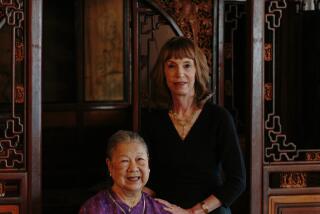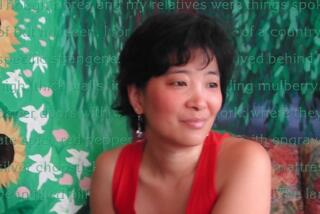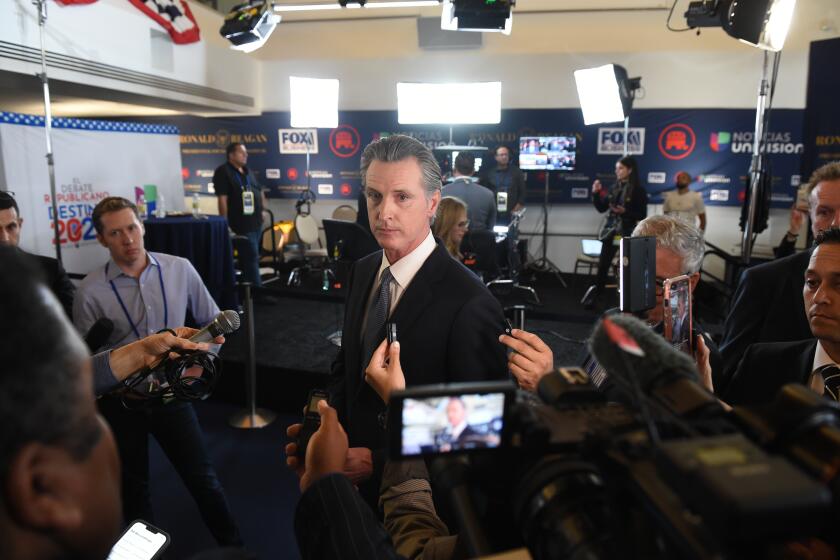Mad, Wounded New York City Turns to Its Poets
In a tiny, subterranean club in Greenwich Village, neighborhood poets are turning the terrorist attacks on the World Trade Center into a poetry of anguish and disbelief.
The Cafe Creole, a Cajun-Caribbean bar with an orange-colored, low-slung ceiling, preempted its usual Monday night open-microphone celebration to give poets a chance to vent verse bred from the tragedy.
There is a tradition of calamity inspiring poetry--as W.H. Auden said in his memoriam to Yeats, “Mad Ireland hurt you into poetry.” Now the madness, the hurt and the tradition have descended here.
For hours the poets stepped forward: poets who have been writing for years, poets who had never before attempted a poem, so many poets that the jazz combo that was to follow the poetry had to be delayed.
“Every artist I know is struggling to deal with this terror in their art,” said April Hewitt, poet and the evening’s mistress of ceremonies. “Many artists find themselves totally blocked because of what happened. For others, reading their poetry is therapy.”
Accompanied by a synthesizer and bongo drummer, the poets held forth. In the corner, a muted television showed repetitive images of the towers tumbling. An American flag hung behind the bar, put there by the bartender, also a poet.
In a voice of grief, Hewitt read:
silence vibrates
the day after
smoke swirls
numb dust
black drops fall to charred cheeks
chasing blood stains
footsteps echo behind
screaming sirens
barefoot women in silver soot suits find
refuge line to
Brooklyn
Heroes have 15 minutes before joining history
Mireya Perez, who teaches Spanish, took images and phrases from the thousands of fliers posted throughout the city by relatives desperately seeking missing loved ones, almost assuredly in vain.
Hey, Jude, you are missed
and Nestor, from the 104th
Katie Marie on the 97th
Scott, aged 22, on the 105th
Doris, Patrick, Susan, Eskednet,
Mariana, Justin
And Joseph who had a star
On his right thigh
Leaves, flags, candles, words, songs
Shattered, seared we gather.
Wayne Palesado, an employee of the city parks department at Washington Square, saw the planes smash into the twin towers. In “Beckoning,” Palesado worried about American retaliation:
Who will be our savior
In this soil soiled
By these wings of terror?
The beast has knocked on our door
Will we answer to its beckoning roar?
For it beckons for us to become
The beast ourselves.
Tommasso Della Fave, 81, a pensioner from Newark, caught the terror of those who fled and suggested that someday they may agonize about not having helped others.
Our first instinct is to run
Escape Sodom and Gomorrah
Don’t look back
This guy I met and know
Done just that
80 flights up
The first blast
The first rock
Got the hell out of there
And lived to talk about it.
The conscience of man
Forever reminds him
That maybe perhaps
His is not always
The final answer.
When the readings were over, the poets passed a hat to collect funds for relief efforts, then drifted out to MacDougal Street, still teeming with tourists and jazz joints and falafel and pizza stands. In the air was a hint of the smoke from the smoldering rubble pile that once comprised the tallest buildings in the city.
Other readings are being scheduled, and other poems written.
“I’ll be dealing with the topic again, I have to,” said Palesado.
Pulitzer Prize-winning poet Philip Levine, a visiting professor at New York University, said he expects the terrorist attack--and the threatened American counterstrikes--to profoundly influence poets, particularly younger ones.
For poets, he said, the crisis is a kind of an artistic call to arms to both make the experience more vivid “than the parsons, the politicians and television commentators” and also to criticize any American excesses.
“When there is savagery around, that is when poetry is needed most,” he said.
More to Read
Sign up for our Book Club newsletter
Get the latest news, events and more from the Los Angeles Times Book Club, and help us get L.A. reading and talking.
You may occasionally receive promotional content from the Los Angeles Times.






